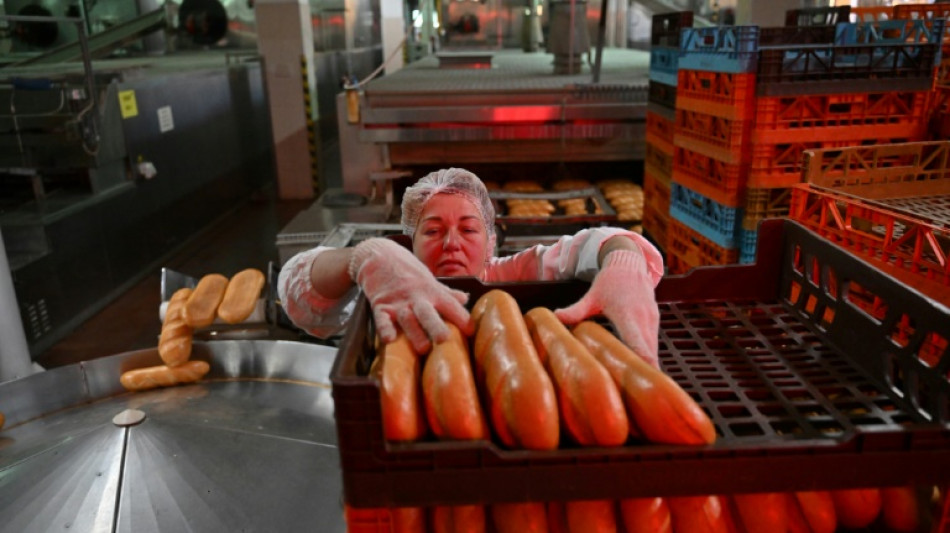
-
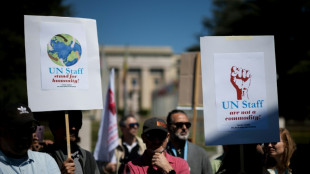 'Not a commodity': UN staff rally over deep cuts
'Not a commodity': UN staff rally over deep cuts
-
Flintoff proud as Afghan refugee protege plays for Lancashire second team

-
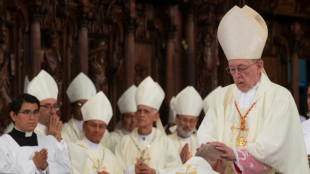 Peruvian cardinal accused of abuse challenges late pope's sanction
Peruvian cardinal accused of abuse challenges late pope's sanction
-
Trans women barred from women's football by English, Scottish FAs
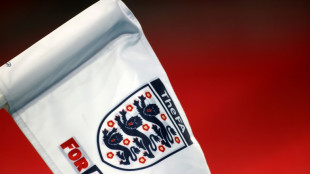
-
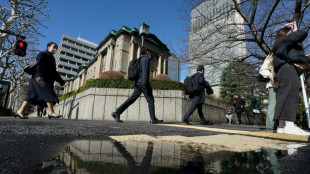 Oil prices drop, stocks diverge amid economic growth fears
Oil prices drop, stocks diverge amid economic growth fears
-
Israel brings fire near Jerusalem 'under control', reopens roads
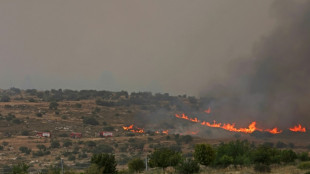
-
 Lopetegui appointed coach of Qatar
Lopetegui appointed coach of Qatar
-
UK counter-terrorism unit probes rappers Kneecap but music stars back band

-
 Yamal heroics preserve Barca Champions League final dream
Yamal heroics preserve Barca Champions League final dream
-
2026 T20 World Cup 'biggest women's cricket event in England' - ECB
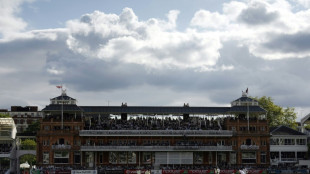
-
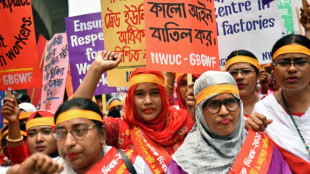 Bangladesh begins three days of mass political rallies
Bangladesh begins three days of mass political rallies
-
Children learn emergency drills as Kashmir tensions rise
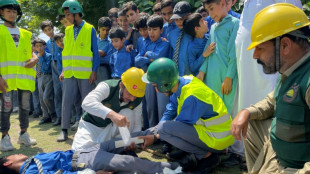
-
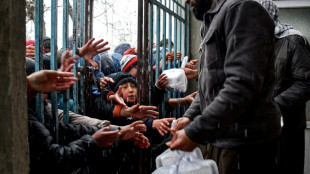 Millions of children to suffer from Trump aid cuts
Millions of children to suffer from Trump aid cuts
-
Veteran Wallaby Beale set for long-awaited injury return
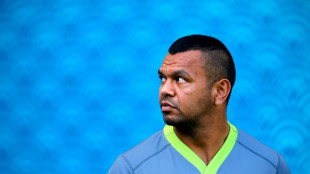
-
 Syria's Druze take up arms to defend their town against Islamists
Syria's Druze take up arms to defend their town against Islamists
-
Tesla sales plunge further in France, down 59% in April

-
 US calls on India and Pakistan to 'de-escalate'
US calls on India and Pakistan to 'de-escalate'
-
Israel reopens key roads as firefighters battle blaze

-
 Europe far-right surge masks divisions
Europe far-right surge masks divisions
-
James will mull NBA future after Lakers playoff exit

-
 Ukraine's chief rabbi sings plea to Trump to side with Kyiv
Ukraine's chief rabbi sings plea to Trump to side with Kyiv
-
Australian mushroom meal victim 'hunched' in pain, court hears

-
 Lakers dumped out of playoffs by Wolves, Rockets rout Warriors
Lakers dumped out of playoffs by Wolves, Rockets rout Warriors
-
Booming tourism and climate change threaten Albania's coast

-
 US reaching out to China for tariff talks: Beijing state media
US reaching out to China for tariff talks: Beijing state media
-
Tariffs prompt Bank of Japan to lower growth forecasts

-
 Kiss faces little time to set Wallabies on path to home World Cup glory
Kiss faces little time to set Wallabies on path to home World Cup glory
-
Serbian students, unions join forces for anti-corruption protest

-
 Slow and easily beaten -- Messi's Miami project risks global embarrassment
Slow and easily beaten -- Messi's Miami project risks global embarrassment
-
Fan in hospital after falling to field at Pirates game

-
 Nuclear power sparks Australian election battle
Nuclear power sparks Australian election battle
-
Tokyo stocks rise as BoJ holds rates steady

-
 Bank of Japan holds rates, lowers growth forecasts
Bank of Japan holds rates, lowers growth forecasts
-
'Sleeping giants' Bordeaux-Begles awaken before Champions Cup semis

-
 Napoli eye Scudetto as Inter hope for post-Barca bounce-back
Napoli eye Scudetto as Inter hope for post-Barca bounce-back
-
Germany's 'absolutely insane' second tier rivalling Europe's best

-
 PSG minds on Arsenal return as French clubs scrap for Champions League places
PSG minds on Arsenal return as French clubs scrap for Champions League places
-
UK WWII veteran remembers joy of war's end, 80 years on

-
 Myanmar junta lets post-quake truce expire
Myanmar junta lets post-quake truce expire
-
Rockets romp past Warriors to extend NBA playoff series

-
 Messi, Inter Miami CONCACAF Cup dream over as Vancouver advance
Messi, Inter Miami CONCACAF Cup dream over as Vancouver advance
-
UN body warns over Trump's deep-sea mining order

-
 UK local elections test big two parties
UK local elections test big two parties
-
US judge says Apple defied order in App Store case

-
 Seventeen years later, Brood XIV cicadas emerge in US
Seventeen years later, Brood XIV cicadas emerge in US
-
Scorching 1,500m return for Olympic great Ledecky in Florida

-
 Israel's Netanyahu warns wildfires could reach Jerusalem
Israel's Netanyahu warns wildfires could reach Jerusalem
-
Istanbul lockdown aims to prevent May Day marches

-
 Former U.S. Attorney and Assistant U.S. Attorney Join National Plaintiff Law Firm Singleton Schreiber as Spokane Partners
Former U.S. Attorney and Assistant U.S. Attorney Join National Plaintiff Law Firm Singleton Schreiber as Spokane Partners
-
Minnesota-Based Saint Therese Acquires the Belvedere Senior Community in Westlake, Ohio


Bread factory holds tough as Ukraine hopes for recovery
Balls of dough file past on the assembly line and a sweet scent fills the air at a bread factory that embodies Ukraine's determination and its tentative recovery 100 days on from Russia's invasion.
Located near the capital Kyiv, the Tsar-Khlib factory continued production even as Russian troops advanced, keeping city residents fed despite a missile attack on a neighbouring facility.
Tsar-Khlib had to contend with extreme challenges.
At one point, the factory was less than eight kilometres (five miles) from the front line, and many of the factory's workers were stranded in territory held by Russian forces. Most of its clients had fled to safety.
"But we quickly realised that we had to keep producing because some people were staying on," said Anton Paliy, the 43-year-old head of production.
In the end, the immediate crisis passed, as Russian troops withdrew from the area at the end of March.
Operating with just a fraction of its 800 employees, the factory continued producing 16 tons of fresh bread a day, compared to its normal level of 100 tons.
When the air raid sirens sounded, workers would run into the basement. When they returned, they would find messy piles of fresh bread outside the oven.
Paliy said the sound of the machinery drowned out the noises of war in the background, making the situation a little more bearable "psychologically".
- Kyiv residents returning -
The state-of-the-art Shanta factory, just a few hundred metres away, was not so lucky. Russian missiles destroyed the building on March 16.
Oleksandr Tarenenko, the director of Khlibni Investizii, which owns both facilities, said the attack was a war crime because Russian forces had targeted civilian infrastructure.
A missile shot down by Ukraine's air defence forces can still be seen outside the building.
Reconstruction could be lengthy and costly, and the facility's 140 workers are unemployed.
But at Tsar-Khlib, activity is picking up as Kyiv residents return to the city.
Demand "is increasing every week", said Tarenenko.
The International Monetary Fund expects Ukraine's economy to shrink by 35 percent this year, but parts of the country are slowly recovering despite the ongoing conflict in the south and east.
In Kyiv and the surrounding region, "consumer demand is increasing, connections are being restored", Finance Minister Sergiy Marchenko told AFP.
Even the return of foreign embassies was sending a signal to the public that the capital is open for business and residents were returning to "re-launch their economic activities", Marchenko said.
- 'We did our job' -
Even in Ukraine's second biggest city, Kharkiv, whose outskirts are still being shelled by Russian forces, there are some signs of recovery.
The popular Cafe Crystal, in a central park, re-opened its doors at the end of April after two months, although the menu is limited, and the staff are down to seven or eight from 30 or 40 before the war.
"We have to keep jobs. The city is gradually reviving. People want to come out and have a coffee," said Alyona Kostrova, the manager.
"After staying in bomb shelters, they want to live a little."
At Tsar-Khlib, production has gone up to 50 tons a day and Paliy said he felt at least some comfort in "feeling useful in these difficult times".
"It's not that I want a medal, but we did our job -- we helped people," he said.
"And we will continue to do it."
D.Moore--AMWN